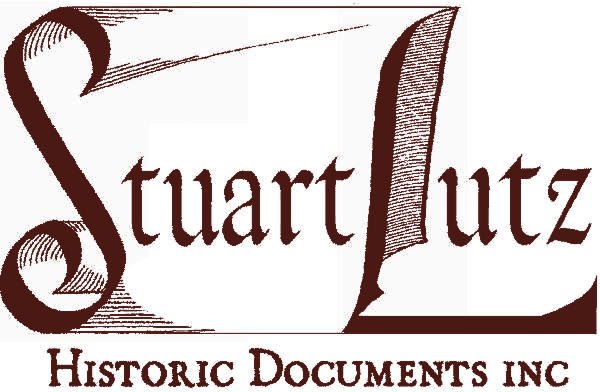| |
 (1654 MASSACHUSETTS DOCUMENT) (1654 MASSACHUSETTS DOCUMENT) |
|
|
|
|
| |
Price: $1,500.00 |
Stock# 4803 |
| |
A VERY EARLY COLONIAL DOCUMENT FROM BOSTON – A YOUNG MAN IS FINED FOR LYING TO AVOID PUNISHMENT
(BOSTON – COLONIAL MASSACHUSETTS). ADS. 1pg. 7” x 4”. 1654. No place [Boston]. An autograph document signed “Jonath: Hayne Clerk”. The document states: “Att a meeting ye Sixteenth Day of ye eleventh month 1654 Captain Keayne, Mr. Duncan, Mr. Parker, and Mr. Stoddard being prsent Henry Messenger was fined ten shillings for affirming that he had corected his sonn John for playing in ye meeting house which appears to be a lye, to prvent the Commissioners of laying any punishment upon him, ye boy himself said he was corected by his mother...”. It is marked at the conclusion “This is a true copy of the record”. The Town Commissioners were chosen to adjudicate minor offenses; the first named is probably Robert Keayne, an English militia officer and early Boston official. Nathaniel Duncan, Richard Parker, and Anthony Stoddard are all listed as Commissioners. “Sonn John” was born in 1641; his younger brother Henry Messenger, Jr. became a joiner and a chairmaker of note. The practice of seating boys together during religious services might have contributed to, John's problem. An interesting example of colonial punishment during Boston's third decade. Mostly fine with paper tape repair to a fold separation on the verso and minor discoloration in a blank area. Pre-1670 American documents are rare. |
4803
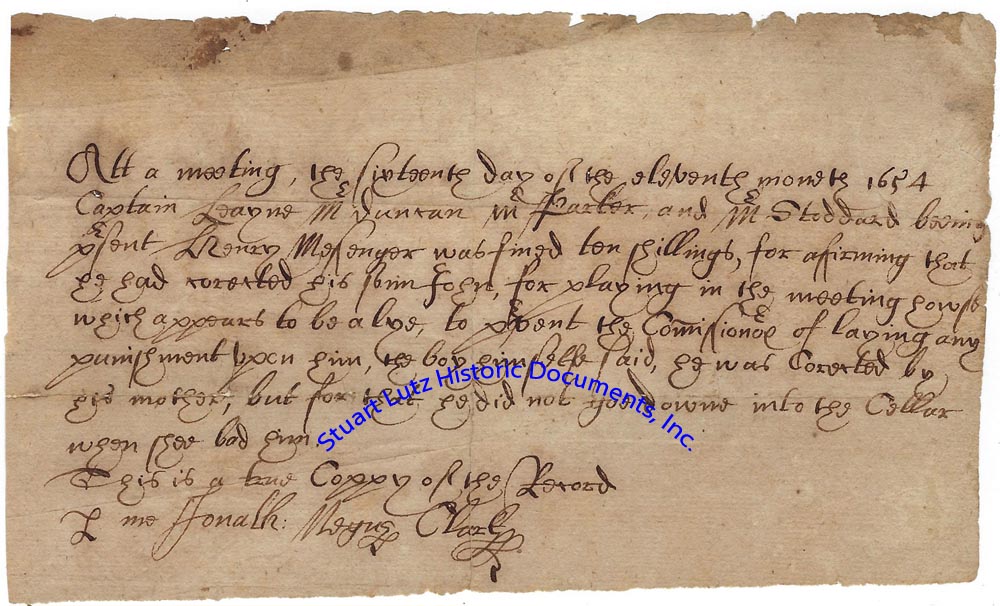
|
|
| |
| |
 (ANTI-STAMP ACT MANUSCRIPT) (ANTI-STAMP ACT MANUSCRIPT) |
|
|
|
|
| |
Price: $7,500.00 |
Stock# 4496 |
| |
NEW HAMPSHIRE’S REVEREND PAGE WRITES A FIERY ANTI-BRITISH SERMON AFTER THE PASSAGE OF THE STAMP ACT: “WE HAVE BEEN INVOLVED IN A CONTROVERSY OF A MOST INTERESTING NATURE WITH GT. BRITAIN…LAWS BINDS ON YE COLONIES IN ALL CASES WHTSOVER PASSED MANY GREVIOUS ACTS TENDS TO DESTROY OUR CONSTITUTION ROB US OF OUR FREEDOM & SUBJECT US TO A STATE OF INGLORIOUS SERVITUDE…SOME & NOT A FEW OF OUR BR HAVE FALLEN IN BATTLE WHOSE MEMORIES ARE DEAR TO US FOR HAVING FALLEN IN DEFENSE OF YR COUNTRY – UNWEARIED PAINS HAVE BEEN TAKEN TO ROUSE YE SAVAGES OF YE WILDER & AGAINST US…IT IS NOT ENOUGH YT GT BRITAIN DROVE OUT OUR PIOUS ANCESTORS BY YE IRON ROD OF TYRANNY…WE CONSIDER ALSO HOW MANY UNDENIABLE PROOFS YE AMERICAN COLONIES HAVE GIVEN FM YE BEGINNING OF YR LOYALTY & FIRM ALLEGIANCE TO YE BRITISH KINGS…HOW CRUEL MUST IT APPEAR IN YE MOTHER COUNTRY TO ATTEMPT & ENDEAVOR TO DEPRIVE US OF OURS SO DEARLY BO’T & UNFORFEITED LIBERTY & TO REDUCE US TO SERVITUDE & BONDAGE…”
REVEREND JOHN PAGE (1738-1783). Page received from Harvard College his AB in 1761 and his AM in 1764. He was ordained as a Congregational minister in Danville, New Hampshire in 1763. He died of smallpox on January 29, 1783 after tending to sick parishoners.
THE STAMP ACT. In the wake of Britain’s expensive victory in the French and Indian War, Parliament decided to tax the colonists to pay for the conflict. In 1765, the British government required that materials printed in the colonies use paper produced in London and bearing an embossed revenue stamp; this included newspapers, legal documents, etc. Additionally, Parliament stated that the tax had to be paid with British currency, not cheap colonial paper money. The colonists thought the tax was unfair and that they had no say in its passage. Street protests erupted in several states and there were political measures taken too. In October 1765, the Stamp Act Congress, attended by nine colonies, was held in New York City. Across the Atlantic, Parliament got the message about the Stamp Act, and voted to repeal it in February 1766. The Stamp Act, however, was the forerunner to the Townsend Act and other unpopular measures Parliament took, and they are regarded as perhaps the first shot in the quest for Independence.
AM. 3 ¾” x 6 ¼”. 20 pgs. 1765-1766. No place [Danville, New Hampshire]. A lengthy and fiery manuscript sermon delivered by Reverend John Page of Danville, New Hampshire. The minister responded to the Stamp Act from the pulpit. In this manuscript (which was likely his reading copy), Reverend Page frequently uses abbreviations (i.e. “Chh” for “Church” and “Jes” for “Jesus”). He mixes Biblical stories with what was occurring in the Colonies. The sermon begins as the usual fire and brimstone from the era with a mention of Revelation 3:2 (“ Be watchful, and strengthen the things which remain, that are ready to die: for I have not found thy works perfect before God”), and then states: “This Chap begins with ye Epistle of our Jes & to ye Chh of is in Sardis (wh was one of ye Seven Chh…in Asia) after ye Glorious Description given of & yt he has ye Seven Spirit of - & ye Seven Stars – he acquaints ye Ch with her own State & Condition yt tho she had a Name to live – yet was dead – he then propounds a remedy & a Reason to excite them to ye else of ye same – ye Remedy in this to be watchful & to strengthen ye Things yt remain yt are ready to die – I shall consider at ye time only ye first of these – Be watchful & here I shall show…so yt we must keep ye at all times in all places upon all Occa when we are along & when we are in Company Abroad and at home…in Civil Affairs & moral…in our Religious Duties…”. Several pages in, Reverend Page turns his attention to the effect of the Stamp Act on his parishoners: “see as first hand as ye is truly ye case with New England & with America for several years past we have been involved in a controversy of a most interesting nature with Gt. Britain a Controversy wh Strikes at ye root of our Civil & gtly endangers our religious liberties & privileges – ye British parliament in wh we are in no sense represented have in performance of an assumed right to…Laws binds on ye Colonies in all Cases whtsover passed many Grevious Acts tends to destroy our Constitution rob us of our freedom & subject us to a state of Inglorious Servitude alarmed at these proceeds, ye Colonies have referenced…& remonstrated but all in vain to who control ye Councils of Gt. Britain. Beg determined as it seem at all hazards by force & violence to carry yr oppressive schemes into Exect – ye last year have al last been driven to extremity & America have been reduced to ye disagreeable Necessity of resist to blood – British troops have stand yr honor by draw ye Sword & commence hostilities against yr Brethern & fellow subjects for ye base purposes or enslave…have wantonly ravaged & destroyed some of our sea port Towns & many of our B[rether]n driven fr them &…other sea ports have been obliged to seek a quiet residence in ye Country for ye unprovoked insults & outrages of these Instruments of ministerial Vengeance & ambi – Some & not a few of our Br have fallen in Battle whose memories are dear to us for having fallen in Defense of yr Country – unwearied pains have been taken to rouse ye Savages of ye Wilder & against us & excite yn to fall on our frontiers in short every iniquitous method has been attempted for brining Slavery & misery upon us – but it is not enough yt Gt Britain drove out our pious ancestors by ye iron rod of Tyranny…& forced yr to flee for refuge into ye howling wilder of America, but must she also pursue us yr Posterity into these remote regions to chastise us with ye same rod for no other fault…beg a free peo[ple] & beg resolved to continue so – out worthy Progenitors in order to remove yms. Out of ye reach of civil & ecclesiastical Tyranny & to enjoy unmolested ye Bless of Liberty voluntarily exchanged ye pleasant fields of Britain for ye inhospitable wilds of America & wr we (onside ye qt & almost unsuperable Difficulties wh our fore fathers underwent in leaving yr Native Country & transplanting…in Yr Land for ye Love of Liberty ye Bless we of wr not permitted to enjoy on Cheaper terms – wn we consider also how many undeniable proofs ye American colonies have given fm ye Beginning of yr Loyalty & firm allegiance to ye British kings & yr warm affect ye parent State & wn we consider also yt Britain has been amply paid for all ye Expense she has ever been at in protects us by regulating our Trade so as to secure ye principle advantages & profits yr of to hers – I say wn we consider these & how unjust how cruel must it appear in ye mother country to attempt & endeavor to deprive us of ours so dearly bo’t & unforfeited Liberty & to reduce us to Servitude & Bondage. But when we must look above ye Instruments of our Troubles must look to ye Supreme Disposer of all events ye providence of presides over ye…in all human affairs – all second Causes & subordinate arguments are subject to his Govermt no Event happens contrary to or besides his will either positive or promissive riches honor & Prosperity come fm him & all adversaries & Calamaties whether public or private are ordered by him is yr evil in yr City & ye has not done it wtever confer & disorders, wars tumult & Bloodshed yr are in ye all these 5 are subject to ye superintend, providence of infinitely wise & infinitely gracious - & tho we have reason to all use ye Instruments of our Troubles of gt Injustice Trials to be just considered as ordered by we must acknowledge ye we are justly dealt with by – in all yt is bro’t upon us for shall not ye Judge of all ye do right we know yt it is impossible for him to do otherwise - - ye most dark & intricate footsteps of his providence are agreeable to ye Eternal Rules of R & would appear so to us had we a Clean Comprehen= of ye whole plan of his Moral Govermt & thus tho has been afflicting us & bro’t sore & distress calamities upon us by ye Sword of our unjust cruel & unnatural Enemies yet his anger is not turned away but his hand is stretched out yt still ye sword is yet unsheathed & baths its in Blood ye war continues & ye…are multiplied tho hand has been heavy upon us yet ye token of his displeasure are not removed his hand is not withholden we have reason to lament in ye wds of Jeremiah o thou sword of ye – how long will it be ere than be quiet put…into thy scabbard…”. There are several more pages of Bible stories and sulfuric references. Danville, New Hampshire is just a few miles inland from Portsmouth. In September 1765, a mob gathered and burned the local stamp collector in effigy. On November 1, 1765, the day the Stamp Act official became law, Portsmouthians had a mock funeral for Liberty, complete with a coffin and ringing bells. Surely Reverend Page was aware of what was occurring in nearby Portsmouth, as well as Boston just to the south. The manuscript is in very good condition with dark ink, though written in a small hand. There are some light stains and a few of the pages have their edges chipped, affecting a few words. The best, most anti-British passages are mostly written on four smaller pages glued in the center of the manuscript. The American Book Prices Current shows no other Stamp Act sermons ever selling. A fine example of anti-British sentiment from a minister, and it is representative of the energies and resentments that led to the American Revolution a decade later. |
4496
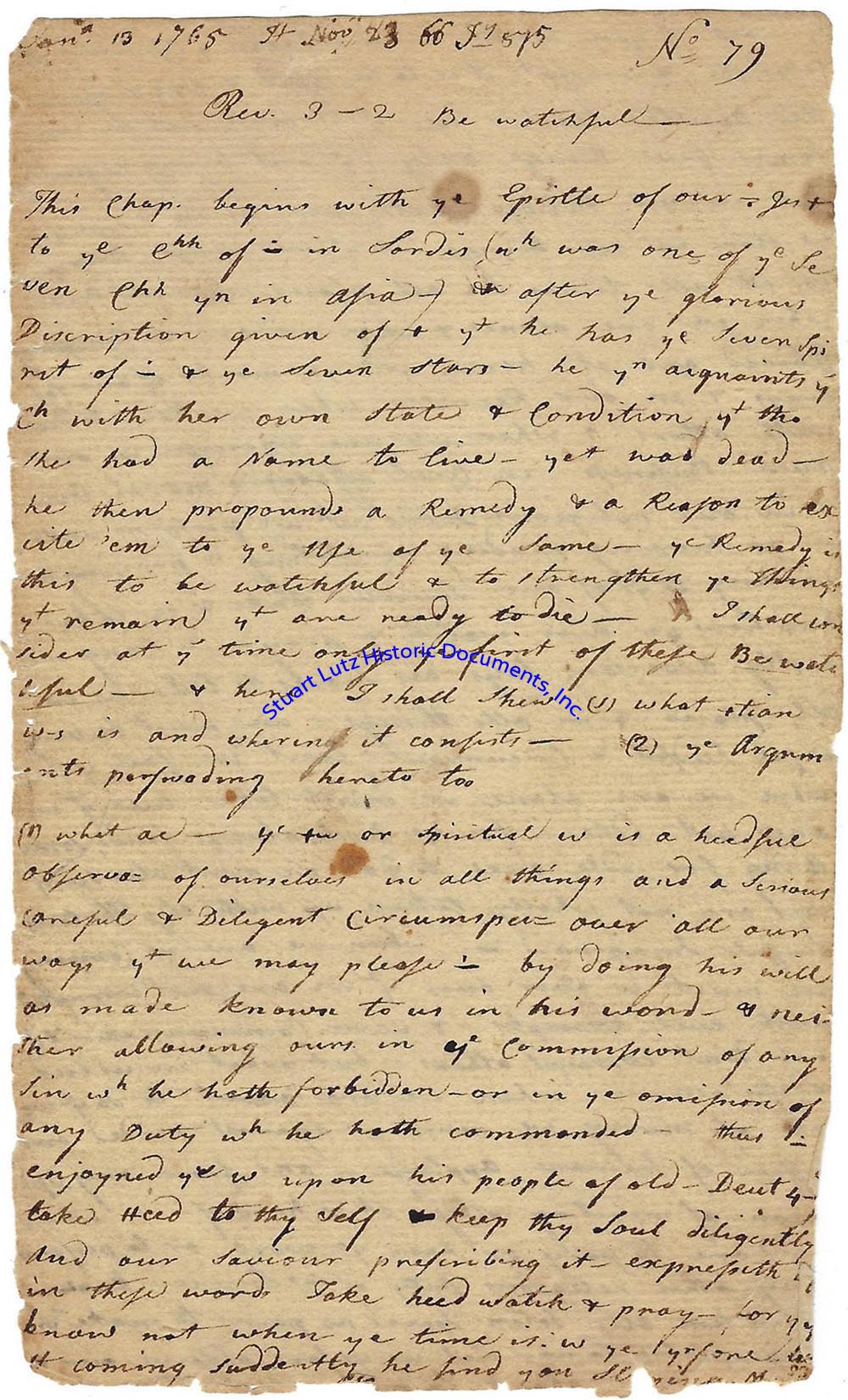
|
|
| |
| |
 (BENEDICT ARNOLD) (BENEDICT ARNOLD) |
|
|
|
|
| |
Price: $2,500.00 |
Stock# 5477 |
| |
CONTEMPORARY COPY OF AN IMPORTANT BENEDICT ARNOLD LETTER ABOUT THE SIEGE OF FORT TICONDEROGA
BENEDICT ARNOLD (1741-1801). Arnold was the traitorous general who turned on Continental forces during the American Revolution.
Contemporary copy. 1pg. May 17, 1775. Ticonderoga, New York. A contemporary copy of an important Revolution-era letter by Benedict Arnold. A week after Arnold and Ethan Allen had captured Fort Ticonderoga from the British, Arnold wrote to Jonathan Brown to appoint him a major in a newly-formed regiment: “Sir, Being appointed by the Committee of Safety at Cambridge, to raise a Regiment of Men, and appoint officers for the same, for the purpose of reducing the Fort at Ticonderoga ect. Confiding in your valour, Judgment & Fidelity, I do by the presents, constitute & appoint you major, of the said Regiment, for which purpose this shall be your sufficient Warrant Benedict Arnold Colo.” The capture of Fort Ticonderoga occurred early in the American Revolution, before the United States had officially declared independence from Great Britain. The Jonathan Brown in question may have been the same John Brown who officially accused Arnold of treason several years before his duplicity was actually revealed. The paper has evenly toned and the writing is dark. |
5477
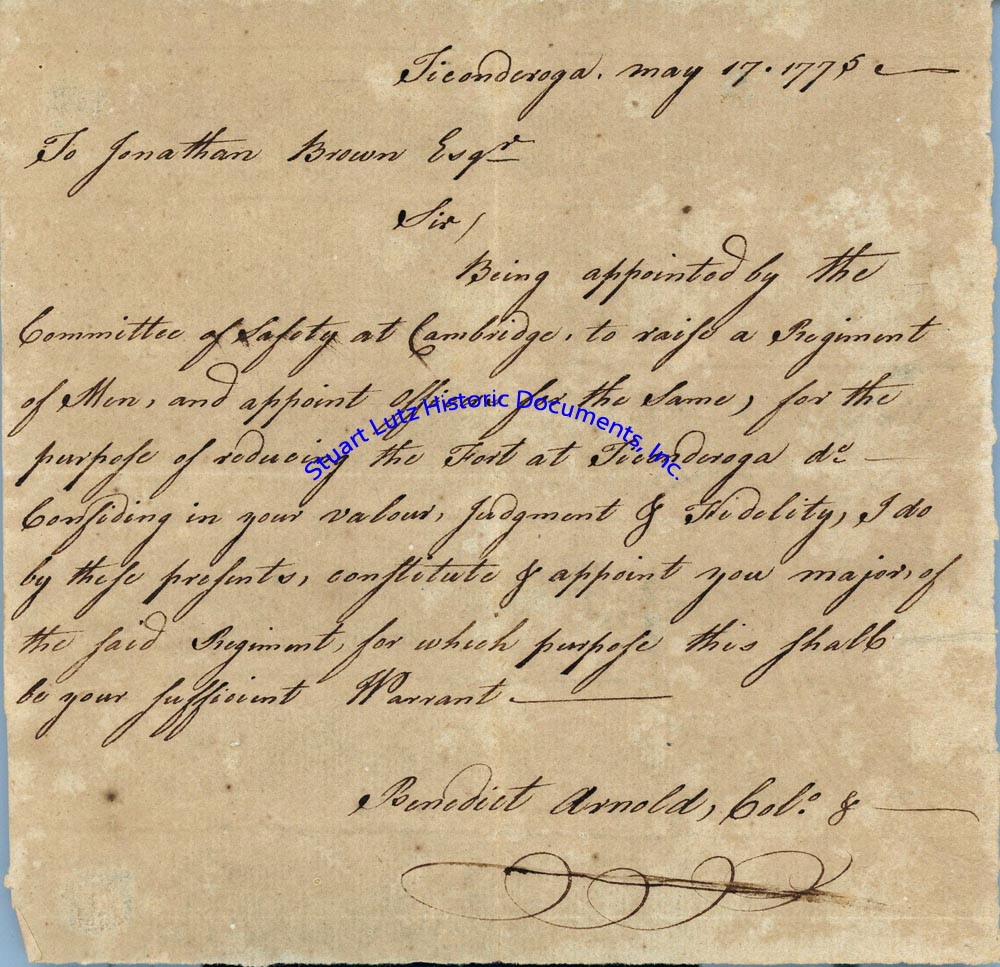
|
|
| |
| |
 (GUADELOUPE) (GUADELOUPE) |
|
|
|
|
| |
Price: $400.00 |
Stock# 6055 |
| |
1759 DOCUMENTS PROVIDES LIST OF BRITISH SOLDIERS SHORTLY AFTER SUCCESSFUL CAPTURE OF GUADELOUPE DURING SEVEN YEARS WAR
GUADELOUPE. The Caribbean island of Guadeloupe is a French overseas department.
DS. 2 pg. 6” x 8”. February 16, 1759. Guadeloupe. A document signed “Geo. Highton Lieu in the 68th Regiment of Foot”. The document is signaling the “Return of the Men at Work of the 63: Regt Commanded by Colo Watson…”. The front of the document provides a list of the soldiers involved in the work party. They are organized by their company. A bill for their work is listed on the front: three shillings for the one officer (most likely Watson), two shillings for the lieutenant, one shilling and six pence for one corporal, two shillings for one mason, and two pounds and one shilling cumulative for 41 privates. The back of the document indicates that Highton is ordering a paymaster, John Barnes Esq, to pay “the above bill by me”. David Watson was a Scottish officer and military engineer in the British Army tasked with the colonelcy of the 63rd Regiment of Foot. This regiment took part in the successful invasion and seizure of French Guadeloupe in the West Indies in 1759. Guadeloupe was so economically important to the French that they willingly traded French Canada to the British in the Treaty of Paris in order to reacquire it. This document was written just weeks into the invasion, and so it is likely that some of the men listed on this document were among the nearly 800 British that died on the island that year. Known examples listed who were later KIA include Lieutenant-Colonel P. Debrisay, Major John Trollop, and Lieutenant George Highton himself, who died of disease. The document is in fine condition with some folds. |
6055
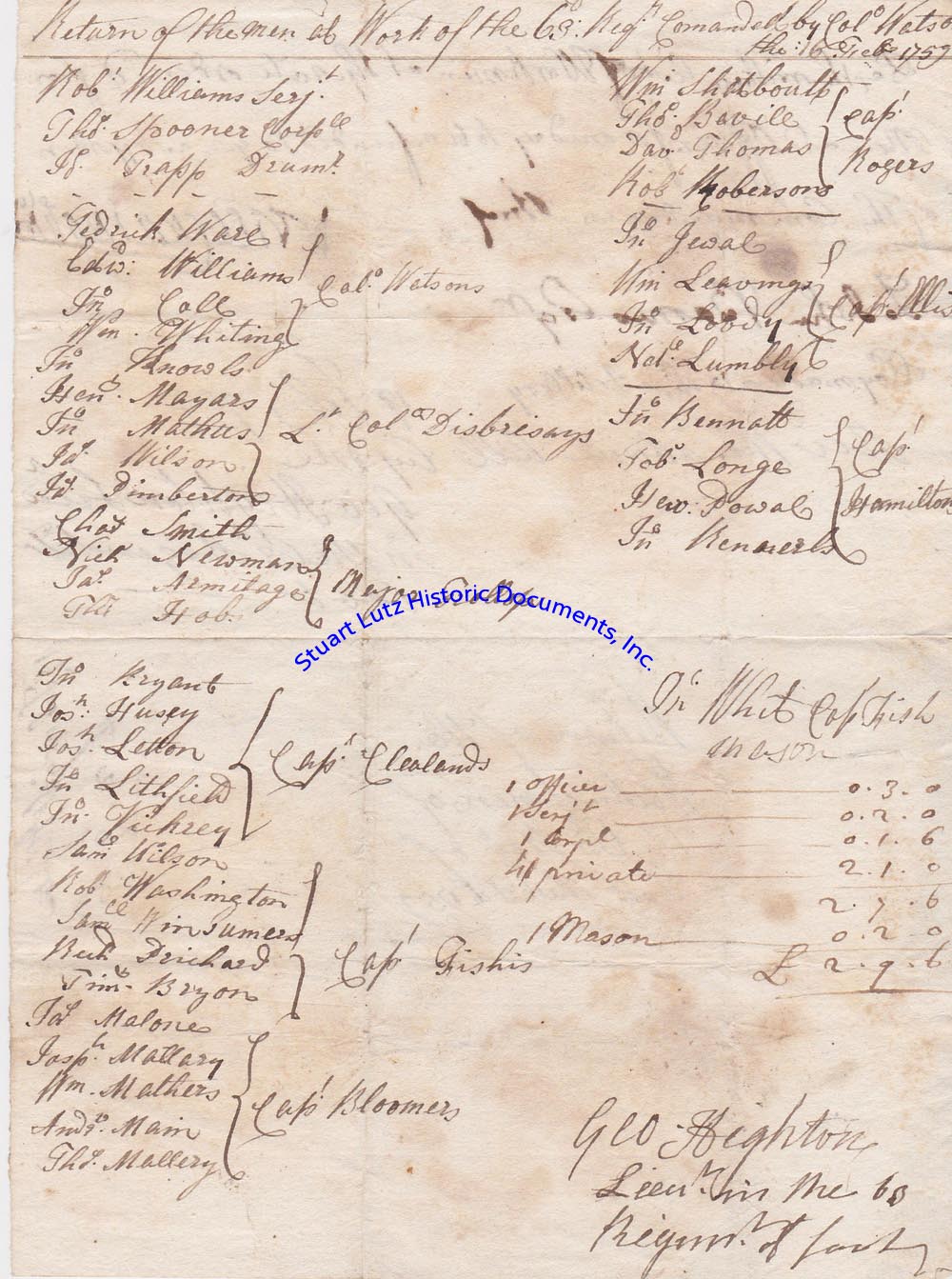
|
|
| |
| |
 (NEW HAMPSHIRE - REVOLUTIONARY WAR BOND) (NEW HAMPSHIRE - REVOLUTIONARY WAR BOND) |
|
|
|
|
| |
Price: $2,500.00 |
Stock# 3201 |
| |
THE PORTSMOUTH RESIDENT JOSEPH LEIGH PLEDGES $5,000 TO SERVE AS “AN ASSISTANT COMMISSARY OFFICER, IN THE AMERICAN ARMY, ACCORDING TO THE RESOLUTIONS OF CONGRESS” FOR THE STATE OF NEW HAMPSHIRE
(NEW HAMPSHIRE). DS. 1pg. 7 ¼” x 10 ¼”. May 1, 1778. Portsmouth, New Hampshire. A document signed “Joseph Leigh” and co-signed “Samuel Emerson”. The important document states “Know all Men by these Presents that I, Joseph Leigh of Portsmouth in the County of Rockingham and State of New Hampshire, are holden and stand bound unto the Honble Henry Laurens Esq., President of the Continental Congress, or his Successor in Office in the Sum of Five Thousand Dollars, to which payment well & truly be made and done, I the said Joseph Leigh do bind myself, my Heirs, Executors & Administrators firmly by these presents. Signed with my hand and sealed with my seals: Dated at Portsmouth May first Anno Dom: one Thousand Seven Hundred and Seventy Eight. The Condition of this obligation is such that the above bounden, Joseph Leigh, shall well & truly execute the Office & Trust of an Assistant Commissary Officer, in the American Army, According to the Resolutions of Congress, regulating that Department then this present obligation to be void and of none effect, but in default, thereof, shall stand, remain & abide in full force, strength, power & virtue.” A few weeks later, the New Hampshire Committee of Safety wrote to Leigh, stating that “You are hereby appointed Commissary, to proceed immediately to that post of the Continental Army where the regiments from this state are stationed - to take charge of, & Issue such stores as may be sent there from this state - and you are to observe such orders and instructions as you may from time to time receive from the General Assembly of this state or in the recess thereof from their Committee of Safety - or at any time from the board of war for this State in regard to any matters or things deliver to your care & charge - and you are to render a particular account of your Conduct in and about yr premises and make remittances for the stores delivered to your charge as aforesaid agreeable to the instructions from time to time sent you as aforesaid - and you are to be allowed and paid for your time & expense while in said service, such wages as the issuing Commissarys for the other New England States have & receive for similar services.” There is a paper seal to the right of the Leigh autograph and a small label on the top margin. An unusual Revolutionary War financial document. |
3201
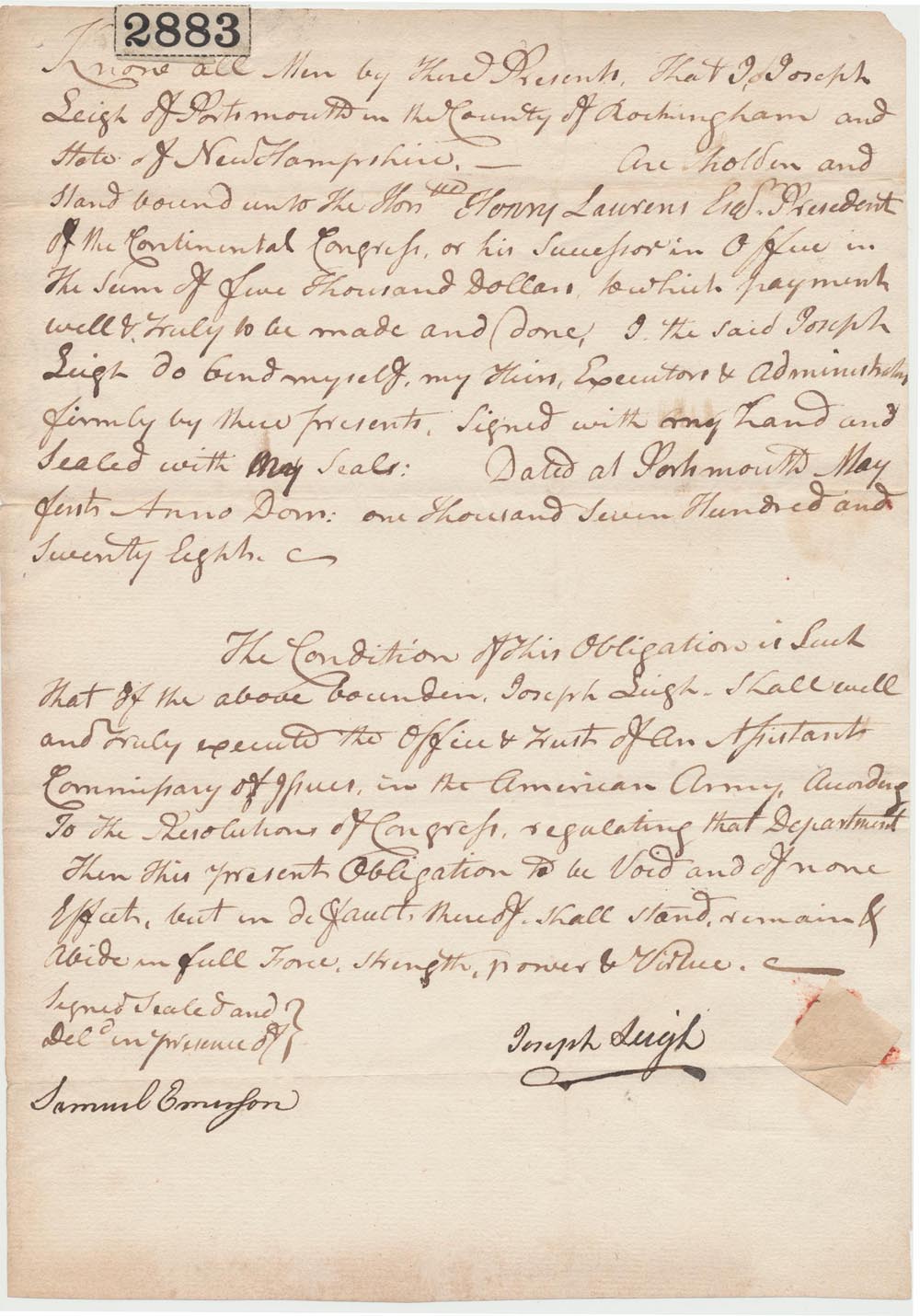
|
|
| |
| |
 (PHILADELPHIA IN THE AMERICAN REVOLUTION) (PHILADELPHIA IN THE AMERICAN REVOLUTION) |
|
|
|
|
| |
Price: $750.00 |
Stock# 4357 |
| |
SHORTLY AFTER THE PATRIOTS IN PHILADELPHIA DECIDE TO REMOVE ALL PROVISIONS THAT COULD FALL INTO BRITISH HANDS, A COMMITTEE IS FORMED “TO ENABLE THEM TO PROSECUTE THE ARDUOUS WORK FOR WHICH THIS BOARD WAS INSTITUTED”
(PHILADELPHIA IN THE AMERICAN REVOLUTION). ADS. 1pg. 8” x 6 ¼”. May 7, 1777. No place [Philadelphia]. An autograph document signed “John Young Secy” stating: “At a meeting of the Committee of Fifty May 7, 1777 On motion. Voted that a Committee be appointed of this board to assist the Commisarys – the better to enable them to prosecute the Arduous works for which this board was instituted. Messrs John Lisle, Robert Smith & Edward Evans were unanimously chosen.” Philadelphia’s Committee of Fifty was chosen in April 1777 to remove all the provisions and stores in the city so that they did not fall into British hands. In early 1777, Washington was uncertain of the British plans, but he suspected they involved capturing Philadelphia. In September, following Washington’s defeat at Brandywine, the British began an eight month occupation of the city, wintering in relative luxury while the Continental Army suffered at Valley Forge. There were some prestigious citizens on the Committee of Fifty, including the painter Charles Willson Peale. The verso states “Copy of the Vote of the Committee of 50 appointing assistant commissary.” The document has a few vertical folds, light chipping to the margins and is in very good condition. Most unusual Revolutionary War content! |
4357
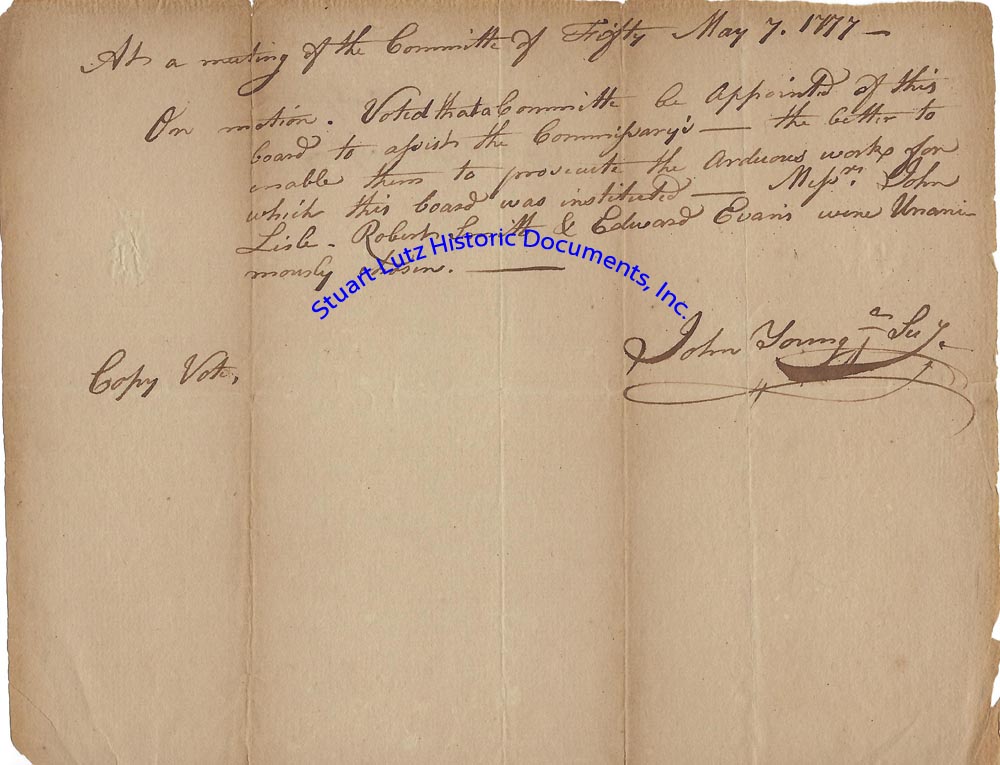
|
|
| |
| |
<Next 6>
|
 |
